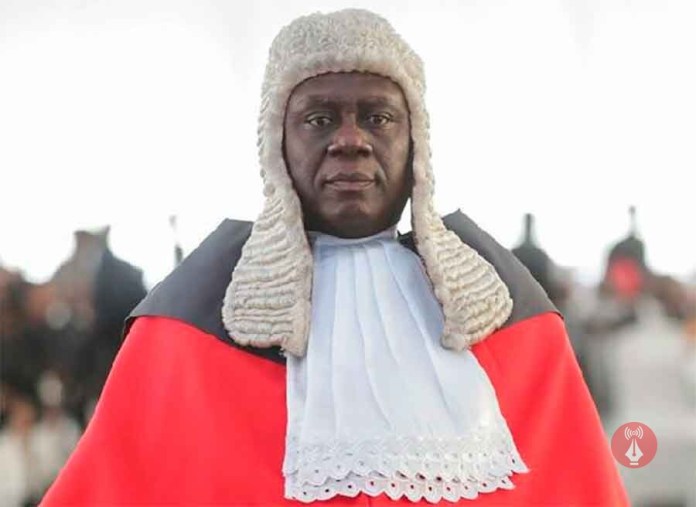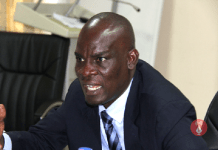Chief Justice Kwasi Anin-Yeboah has made a sharp U-turn from the tyrannical statement issued by the Judicial Service late last week in a covert attempt to censor free expression and suppress media freedom in the country.
According to the Chief Justice, the public and the media can criticise the judiciary as “violently” as they wish, as long as the criticism does not escalate into insults.
This statement is in sharp contrast to the brazen hatchet job done for the judiciary last week by private law firm Sory @ Law, which ordered the Ghanaian media to go into the archives and delete all stories that had been harshly critical of the judiciary.
Yonny Kulendi, Justice of the Supreme Court says the public can criticize judges but those criticisms should be constructive, devoid of insult and personality attacks.
Speaking on behalf of the Chief Justice at a press conference on Wednesday, Yonny Kulendi , a judge at the Supreme Court reiterated the Chief Justice’s mellowed tone saying: “As trustees of the people’s power of justice, we are willing to be criticised. Criticise us as violently as you can, but for Christ -sake, don’t insult us, don’t beret us, don’t speak hatred and don’t malign us.”
“When judges speak, that is the end of our roles, it is not in our place to get into studios, into debates, commentaries, that responsibility falls to you [Media].”
Turning to the media, he Kulendi tasked them to “take this phase of the responsibility very seriously.”
“It is as important as the role you have performed in transmitting the proceedings worldwide because at the end of the day the Ghanaian people own the process,” he said.
In what had drawn to its widespread condemnation since last week, the Judicial Service had issued a statement to order the media to “immediately pull down” from their platforms statements and speeches which “convey, and/or insinuate hateful, spiteful, vengeful, incendiary” communication against justices of the Supreme Court, especially, those hearing the 2020 presidential election petition.
The Judicial Service statement full of threats to the media warned the Ghanaian media from publishing news that will bring the judiciary into bad light, threatening to take “appropriate action to ensure that the media do not abuse the right to free speech.”
Several legal luminaries in Ghana and abroad described the statement as borderline fascism and dared the Judiciary that they cannot gag free speech in Ghana.
The Ghana Journalists Association (GJA) dared the judiciary and described the statement as “scandalous”
“…The GJA is, to put it mildly, dumbstruck in reading this obnoxious directive pregnant with insidious threats to media freedom in Ghana which is touted as a land of freedom and justice. With all due respect, this is scandalous,” said Roland Affail Monney, the GJA President.
The judiciary’s gag order is the latest in the sustained assault on the media in the first four-year term of the Akufo Addo administration.
One journalist has been assassinated due to the instigation of a Member of Parliament of the governing New Patriotic Party (NPP), Kennedy Ohene Agyapong.
Several other journalists have been threatened for following up on stories that exposed underhand dealings in government, with journalists like Manasseh Azuri Awuni, formerly of the Multimedia Group, escaping into exile briefly, and later returning after he was offered round-the-clock police protection. Edward Adeti of Starr FM also faced the same fate after he exposed the corrupt dealing between the corrupt dealings between a Minister of State at the Jubilee House, Rockson Bukari and a Judge in the northern part of the country who were together attempting to cover up illegal Chinese mining operations.
Meanwhile, according to the judiciary which has been at the heart of many bribery scandals and questionable rulings, the conduct of the judiciary cannot be questioned in such instances.
Recently, Minority Chief Whip, Mohammed Muntaka Mubarak, the MP for Asawase in the Ashanti Region, had stated categorically that in early January, during the election of the next Speaker of Parliament, a Supreme Court judge attempted to bribe a female MP of the opposition National Democratic Congress (NDC) to vote against the NDC candidate for the Speaker position, Alban Sumana Bagbin.
Instead of investigating the matter, the judiciary descended heavily on Hon. Muntaka, claiming his allegation had brought the judiciary into bad light.
Eventually, Muntaka apologised for the collateral inferences that his allegation brought. However, in his carefully-worded apology, he did not retract his allegation that indeed a Supreme Court judge who currently sits on the election petition panel was the alleged bribe-giver.
One more scandal that has rocked the judiciary is the undercover stint done by ace Ghanaian undercover investigative journalists, Ana Aremeyaw Anas who, a couple of years ago, exposed deep-seated corruption among Ghanaian judges.
In the report that was broadcasted nationwide as a documentary, he revealed dozens of judges from almost all the hierarchy of the courts in Ghana taking bribes to twist judgments in favour of their highest bidders.
Some of the bribes the judges were exposed receiving include goats, foodstuff and cash.














